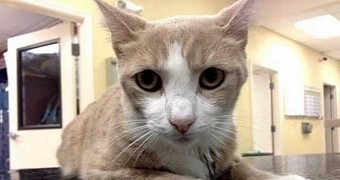Many think them to be the worst possible enemies, but as it turns out, cats and dogs can actually be best friends. In fact, it was not very long ago that a pooch saved a lethargic kitten's life by giving it some of its blood.
The procedure was carried out by Dr. Sean Perry at the Marathon Veterinary Hospital in Florida, US, last month, and the kitten, named Buttercup, appears to be well on its way to recovery. Hopefully, it will soon be back on its paws.
An odd medical case
The Miami Herald tells us that the cat was brought to see Dr. Sean Perry after its owners noticed that the feline was feeling a bit under the weather and wasn't as active as it used to be. Simply put, Buttercup was worryingly lethargic.
Specialists at the Marathon Veterinary Hospital carried out a series of tests and found that the kitten had a very low blood cell count, i.e. 7% as compared to the 35% that is considered the minimum. This indicated that it was anemic.
Dr. Sean Perry told owner Ernie Saunders that Buttercup was in dire need of a blood transfusion. The only problem was that, at that time, the clinic had no cat blood available. What's more, getting some would have taken days, maybe weeks.
Faced with this situation, Dr. Sean Perry proposed that Buttercup be given dog blood. The kitten's owners agreed, and so the feline spent about 4 hours having dog blood pumped into her body.
“Cat's blood is a little harder to come by and not as available as dog's blood. We had greyhound blood packs that we get from a blood bank that has red blood cells separated from plasma,” Dr. Sean Perry said in a statement.
Following this odd intervention, the cat started feeling way better than it did at the time its owners brought her at the Marathon Veterinary Hospital. It is still undergoing treatment with steroids and antibiotics, but specialists are confident that it will eventually recover.
A really lucky cat
Dr. Sean Perry and colleagues explain that such blood interventions are known to specialists as xenotransfusions. They are made possible by the fact that cats do not naturally have antibodies against the red blood cell antigens found in dog blood.
However, they develop such antibodies after being transfused dog blood for a first time. Hence, xenotransfusions are one-time procedures. Luckily, this was Buttercup’s first ever dog blood transfusion.
Funnily enough, it appears that, until the feline started feeling ill and they were forced to bring it to see a vet, the cat's owners had no idea that it was a boy and not a girl. Hence the fact that the feline was given the name Buttercup.

 14 DAY TRIAL //
14 DAY TRIAL //